- Home
- Sharyn McCrumb
The Windsor Knot Page 10
The Windsor Knot Read online
Page 10
Cameron, with a smudge of grease on one cheek, emerged from the depths of the engine and leaned against the wing (known to Elizabeth as the fender). “Well? Did I get anything?”
“A package from your betrothed. The customs form says Invitations, so I have taken care to make plans for this evening. You may address them yourself, and good luck to you. I can let you have some stamps, though, at a price.”
Cameron sighed. He had finished the air filter and was now cleaning spark plugs. “Anything else?” he called out.
“Letter from the Queen, by the look of it. Royal seal and all. You’d better wash your hands before I give it to you.”
“Read it to me.”
“Hold on. Let me set the rest of this stuff down. I wouldn’t want to tear the letter, in case you want to frame it.” He slit the envelope carefully with his penknife. “Just another invitation to the garden party. This one is to Dr. and Mrs. Cameron Dawson. So that’s all right. Elizabeth can rest easy now. It has a funny sound to it, doesn’t it?”
“What?”
“Dr. and Mrs. Makes you seem quite old, somehow.”
Cameron nodded. “I know what you mean. Well, I’ll have to call Elizabeth and tell her the good news. Really, though, I don’t think she ever doubted that she’d be allowed to attend.”
“Touching faith in authority, that. Oh, by the way, we did get one more piece of mail.”
“Yes?”
“Postcard from the gnome.”
Cameron left the car and went to see for himself. “Bloody hell!” He grinned. “Not another one! Where is he this time?”
Ian held out the card. “Alaska.”
“Not-”
“I’m afraid so. Nome.”
The front of the card bore the word Alaska in large red letters and pictured a team of grinning huskies pulling a sled. Cameron flipped the card over and read the inscription: To boldly go where Gnome man has gone before.
CHAPTER 8
WESLEY ROUNTREE WAS wedged into the corner of the back room of Lucy’s Country Garden Flower Shop, trying not to bump into the shelf of bud vases situated perilously close to his left shoulder. On the table in front of him was a fax machine, being attended by Lucy herself, who looked as solemn as a death-row chaplain.
“I have to warn you, Wesley,” she whispered. “This machine doesn’t do too good on photographs. It’s mainly for transmitting paperwork, and it keeps you from having to be on the phone all the time. But don’t expect the picture to come out looking all that great.”
The sheriff sighed. “It probably wouldn’t, anyway. With Emmet being dead and all.”
“Well, I just wanted to warn you,” said Lucy, straightening her pink smock with an air of one who has done her duty. “I hope you can tell if it’s him or not.”
Clay Taylor, lounging in the curtained doorway, held up Clarine Mason’s photograph of her late husband. “We can compare it to this,” he said. “It’ll give us something to go on.”
“And please, Lucy,” said Wesley, “don’t go spreading news about this around town. We don’t know that there’s any crime at all connected with this. It’s probably some mistaken-identity business, and I’d hate to get Clarine all upset with rumors.”
Lucy was a picture of injured innocence. “If you don’t trust me, Wesley, you could have gone to the highway patrol at Milton’s Forge and used whatever it is the police are supposed to use.”
“Officer Vega is sending me a copy of the picture and a set of fingerprints, Lucy. Second-day air. I just wanted a general idea of what the fellow looked like.”
Lucy glanced at the photograph in the deputy’s hand. “Well, if Conway Twitty has gone and died on the L.A. Freeway, you will be none the wiser,” she sniffed.
The machine beeped, then clicked into action, commanding their immediate attention.
“I hope it’s not another flower order,” muttered Clay.
The florist glared at him. “Thanks a lot!”
“No,” said Wesley, peering at the edge of the paper emerging from the machine. “It says Los Angeles at the top. We’ll know in a minute here.”
They waited in silence while the machine thermo-printed the message from California. When it had finished, Wesley eased the sheet of paper out of the machine and motioned for Clay to bring the photograph. Officer Vega had sent them a copy of the black-and-white Polaroid photo of the deceased and a photocopy of a California driver’s license identifying the man as Emmet J. Mason.
Wesley squinted at the photo. Since shades of gray do not transmit in fax communications, the image was a stark contrast of black and white, omitting age lines and other details that might have helped in the identification process. He set the picture down beside the framed photo of Emmet Mason. He looked from one to the other.
“It’s hard to say, isn’t it?”
Lucy tossed her head. “I told you about sending pictures!” she sniffed.
“There’s a definite resemblance,” said Clay. “And the ears are the same shape. They always say that’s a big tip-off in identifying people.”
The sheriff nodded. “I’d say the likeness is good enough to justify me asking a few more questions, even before we get the official photo.” He turned to the florist with his most disarming smile. “Lucy, I thank you for your hospitality. And I sure do appreciate your discretion. When I get ready to donate some flowers to the church in honor of my parents’ anniversary, I’ll give you a call.”
When they were outside, Clay asked, “What do you reckon this means?”
Wesley sighed. “I’d say it means that reports of Emmet Mason’s death were a trifle premature. And I reckon I have to drive back out there and tell Clarine that she’s a widow.”
“That won’t be news.”
“No, but it won’t be pleasant, either. Damn that Emmet! I wonder what he was about.”
“That’s not the half of it,” grunted Clay. “I wonder who’s in that urn on your desk.”
Elizabeth MacPherson was curled up on the chintz sofa in the den, reading a hymnbook. “It’s so difficult to decide what music to choose,” she said, running her finger down the list of titles. “I wonder what they play for weddings in Scotland.”
“‘Amazing Grace,’” said Geoffrey. “Though it’s considered bad form to use it if that happens to be the bride’s name.”
“I think ‘Greensleeves’ is a very nice tune,” she mused.
Geoffrey looked up from his playscript of Twelfth Night. “Since the other title of that melody is ‘What Child Is This,’ I implore you not to use it. You know how people jump to conclusions. What else are you considering?”
“I have a list of songs that were used at some of the royal weddings,” she said, picking up another book. “Prince Charles and Princess Diana had ‘I Vow to Thee My Country.’”
“Very appropriate for them, Elizabeth, but in this case it rather implies that you are handing Georgia over to the Redcoats.”
Elizabeth scowled. “That was several wars ago.”
“It would be worse if you were marrying a Yankee,” Geoffrey conceded, “but I advise you to abandon the idea all the same. What are the other choices?”
“‘O Perfect Love.’”
“Not bad. Who used that one?”
“The Duke and Duchess of Windsor.” She sighed. “Oh, dear, I wouldn’t like to identify with her on my wedding day, poor thing. She’d had two husbands before Edward. Her husband’s family hated her. Her mother-in-law Queen Mary never spoke to her.” Elizabeth shuddered. “And everybody blamed her for the King’s abdication.”
“Cameron is not required to give up seals or porpoises on your account, I trust?”
“No. And everybody seems very calm about the prospect of our marriage. Congratulations, but no confetti, if you know what I mean. Not wildly ecstatic.”
“You’re thinking of Princess Diana, I suppose? I’ve always thought that Prince Charles would have been driven to marry her by public and family opinion alone.”
“Trust you to admire the Scottish royal,” muttered Geoffrey.
Elizabeth ignored him. “She was very charming and not just a social butterfly, either! During the First World War, her family used their castle as a convalescent home for soldiers. And Elizabeth worked as a nurse, even though she was only fifteen at the time.”
“She does not sound like you in the least,” Geoffrey remarked.
“Anyway, she got to know the King’s younger son, Bertie, and when he asked her to marry him, she turned him down.”
“She seems to have had a clearer view of royal life than you do, dear.”
Elizabeth ignored him. “He kept proposing to her, though, and-get this! His parents-the King and Queen, mind you!-said to him, ‘You’ll be a lucky fellow if she accepts you.’ Imagine being that approved of.”
“And were they right?”
“They were. She was marvelous. They got married in 1923, and when she entered Westminster Abbey for the wedding, she laid her bouquet on the grave of the unknown warrior and walked to the altar without it. And during World War II, she actually practiced with a pistol at Windsor, because, she said, if the Nazis invaded England, she wanted to go down fighting. I would like very much to meet her.”
“And her wedding song was…?”
“‘Lead Us Heavenly Father.’”
“I think you ought to go for that one,” said Geoffrey. “It will have sentimental associations for you. Assuming, of course, that you can find anyone around here who can sing it.”
“Yes, I hope I have better luck with musicians than I did with caterers. Did you hear about Charles’s recommendation?”
“Yes,” murmured Geoffrey, looking troubled. “Charles is behaving oddly these days. And don’t say ‘How perfectly normal,’ because I know that he’s always peculiar, but he’s being strange in a different way.”
“Do you think he’s up to something?”
Geoffrey hesitated. “I think he bears watching.”
The sheriff’s reading glasses were perched on the end of his nose as he examined the blue cloisonné urn on his desk. Cautiously he picked it up and checked to make sure that the lid was on tight before examining the bottom. “Made in China,” he announced with a sigh of disgust. “That’s no help.”
“Yeah, I noticed that. It’s heavy, though, isn’t it?” asked Clay, who had just finished photographing the urn and dusting it for prints.
“There’s something in there, all right. I was hoping for a serial number, or-if we were really lucky-the name of a funeral home inscribed on the bottom.”
The deputy shook his head. “It’s never that easy.”
“It is in real life.” Wesley grinned. “Remember the fool who tried to hold up the bank in Decatur, and wrote his holdup note on his own deposit slip?”
“Well, in this case you’re out of luck. You’ve got no clues as to the origin of the vase; no fingerprints, thanks to five years of Clarine’s diligent housekeeping; and no trace of the packaging that the vase was sent in, also thanks to the widow’s cleaning mania.” He took a long swallow of coffee and made a face. Wesley Rountree could not make coffee worth a damn. “I think you’re going to have to open it.”
“You’re right,” sighed Wesley. “I reckon it could just be filled with sand. Before we go any farther in looking into this matter, we have to know.”
He wiped his hands against his trouser legs and took a flat-footed stance facing the desk. Cradling the urn in the crook of his arm, Wesley gripped the lid and turned. After a moment’s hesitation, it turned easily, and within seconds he had set it back on the desktop and lifted the lid.
“It isn’t sand,” he said, peering at the contents of the urn. “It isn’t fine ash, either.”
The deputy ambled over to Wesley’s desk to take a look. “There’s chunks of stuff in there,” he said. “What is that? Bone?”
“Looks like it,” the sheriff agreed. “So we have somebody in this urn, even if it isn’t Emmet Mason.”
“Yeah, but who?”
“Let me think about this,” said Wesley, running a hand across his bristly hair. “I need to talk it out and see what occurs to me. Five years ago Emmet leaves for California on a business trip…”
“Did he?”
“Good question. We know he’s dead there now, but we don’t know that he went there then. What we do know is that five years ago Clarine Mason got a phone call, purporting to come from California, telling her that her husband was dead.”
“But you can make a phone call from anywhere,” Clay pointed out.
“True. And then she got a package, containing this blue urn, supposedly filled with the ashes of her cremated husband.”
“But since we don’t have the wrapping and since she never looked at it, we don’t know that the package actually came from California.” The deputy shook his head. “I don’t think that narrows it down a whole lot, Wesley.”
The sheriff leaned back in his swivel chair and closed his eyes. “I am trying to remember Emmet Mason,” he said. “Friendly fellow, kind of beefy. Ran the hardware store, but wasn’t too interested in tools himself, as far as I could tell. He was big in little theatre, though. He’d lived here all his life. The Masons have been here for a good hundred years. They built that homestead where Clarine lives now before the Civil War.”
“So?”
“I’ve got to call Clarine. Why don’t you get on the other line and call around to all the funeral homes in the area.”
“What for?”
“Ask if any of them do cremations.”
Charles Chandler figured that it was a long shot, at best, considering the amount of time he had at his disposal-ten days, at the most-but he felt that he owed it to himself and his potential as a scientist to make an effort.
With that in mind, he had dressed in his most conventional outfit: khaki slacks, a navy blue blazer, and an ugly yellow tie borrowed from Geoffrey, who evidently prized it. Now, clean-shaven and smelling like Old Spice, he was ready to make a Serious Effort in the matrimonial sweepstakes. He needed the million dollars.
The problem was that he had no idea how to go about locating a suitable young woman. Like Geoffrey, Charles had gone to prep school away from Chandler Grove. After that had come college and the colony of scientists, as Charles liked to call them. He hardly knew anyone in Chandler Grove anymore, a fact that until recently was a source of comfort to him, since he found idle socializing both frightening and time-consuming.
The sudden need of a marriage partner had shed rather a different light on his freedom from social obligation. Now he felt like an outcast, marooned in a strange land whose language he did not speak. Even the most casual encounter made him feel like an alien. What did one reply to the man in a camouflage hunting outfit and a University of Georgia cap who ambled up to him at the gas station and said, “How ’bout them Dawgs?” Charles said that he didn’t own one, which, judging from the man’s reaction, was not the correct response.
Charles was afraid that he might find the female residents of Chandler Grove equally impossible to communicate with. He tried to think of places that he could locate someone who was more of a kindred spirit. He had still received no reply to the letter he had sent to the Georgian Highlander box number. Surely the responses to such a local magazine couldn’t be that numerous; perhaps his literary skills were even worse than he feared. Should he try again? There were Atlanta newspapers and magazines with personals columns for lonely yuppies, but they also required a written reply to a post office box, and there wasn’t time for that. He needed somebody around here that he could relate to. Some other g
roup of outsiders, perhaps, who were in Chandler Grove but not of it.
Earthling!
Charles remembered the group of Earth Shoe people described by Tommy Simmons. Charles had recommended them as caterers for Elizabeth’s wedding partly out of mischief and partly because as a vegetarian himself, he hoped that his cousin would hire them to cater the wedding so that he could enjoy the food. Now he thought of an even better use for Earthling: as a source of suitable women.
Having forgotten exactly where the lawyer had said they were, Charles had to drive about in search of their health-food store. Fortunately, in Chandler Grove, such a quest was not difficult. After ten minutes of driving, he crossed the steel span bridge over the river, having covered the one-block business district of downtown Chandler Grove without finding any new establishments. Once over the river he discovered what he was looking for. The old gristmill, set in a grove of ancient oaks, had been repainted barn red and displayed a sign over its porch-EARTHLING-with a logo: a rainbow over an oak tree.
He parked the family station wagon in the gravel lot next to the riverbank and went in, hoping that a maiden with the soul of Madame Curie and the looks of Joan Baez was waiting for her prince to come. He straightened his borrowed tie.
Perhaps he had overdressed for the part, he thought, looking over the Earthling premises. A sawdust-covered floor was littered with packing crates and barrels of grain, each labeled with a sign hand-lettered in Magic Marker. A homemade cloth banner on one wall proclaimed the back room as the national headquarters for the Central American Prayer and Protest Group. Charles edged his way past plastic tubs of spices to examine the notices on the bulletin board. He had worked his way through Goat’s Milk for Sale; Custom-made Crystal Jewelry; and Advanced Yoga Classes when a gaunt, bearded man emerged from the back room and hailed him with “Yo! How can I help?”
Charles took a deep breath. “I-uh-” Inspiration! “I notice you have a sign up about Central America and I wondered if I could help.”

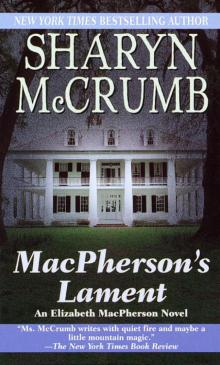 Elizabeth MacPherson 07 - MacPherson’s Lament
Elizabeth MacPherson 07 - MacPherson’s Lament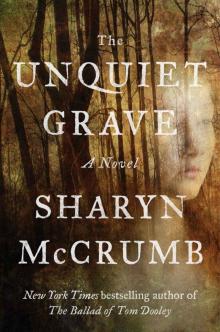 The Unquiet Grave: A Novel
The Unquiet Grave: A Novel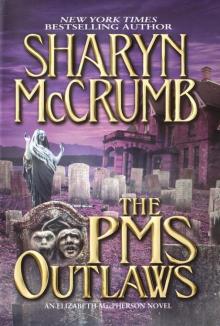 The PMS Outlaws: An Elizabeth MacPherson Novel
The PMS Outlaws: An Elizabeth MacPherson Novel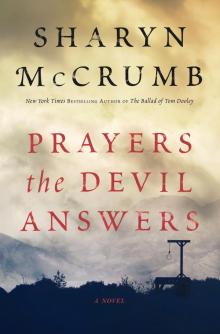 Prayers the Devil Answers
Prayers the Devil Answers Paying the Piper
Paying the Piper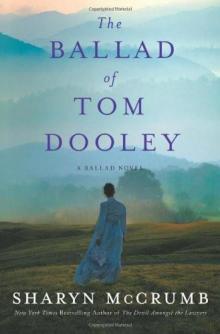 The Ballad of Tom Dooley: A Ballad Novel
The Ballad of Tom Dooley: A Ballad Novel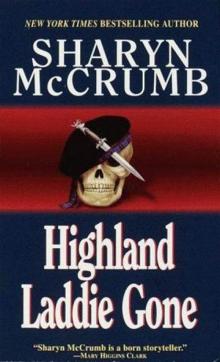 Highland Laddie Gone
Highland Laddie Gone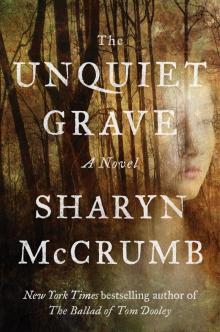 The Unquiet Grave
The Unquiet Grave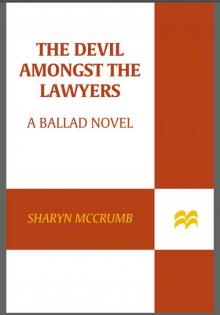 The Devil Amongst the Lawyers
The Devil Amongst the Lawyers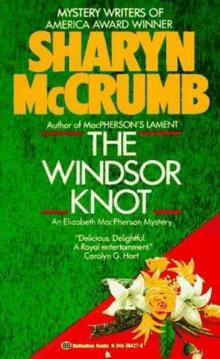 The Windsor Knot
The Windsor Knot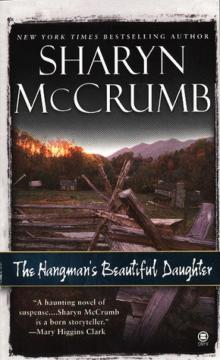 The Hangman's Beautiful Daughter
The Hangman's Beautiful Daughter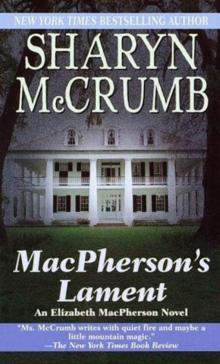 MacPherson's Lament
MacPherson's Lament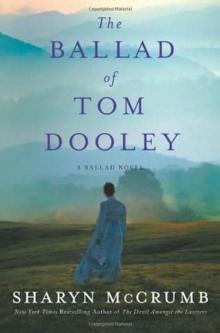 The Ballad of Tom Dooley
The Ballad of Tom Dooley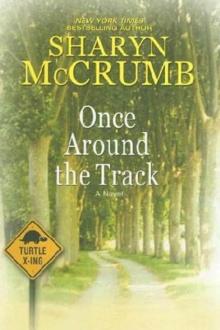 Once Around the Track
Once Around the Track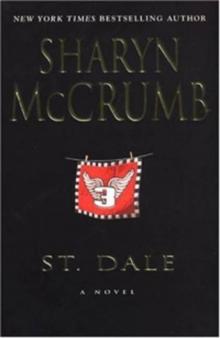 St. Dale
St. Dale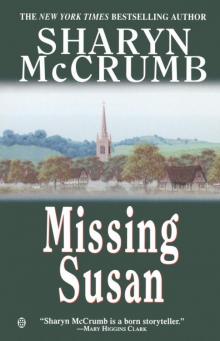 Elizabeth MacPherson 06 - Missing Susan
Elizabeth MacPherson 06 - Missing Susan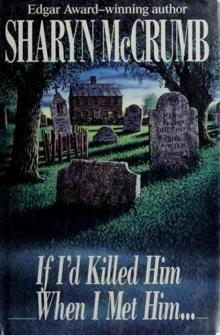 If I'd Killed Him When I Met Him…
If I'd Killed Him When I Met Him…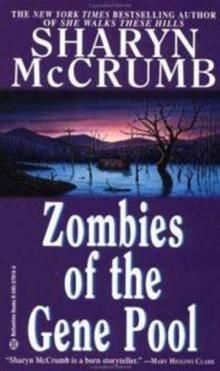 Zombies of the Gene Pool
Zombies of the Gene Pool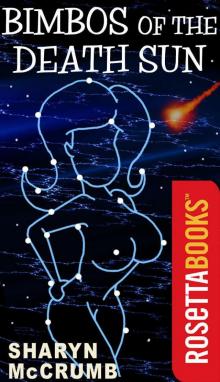 Bimbos of the Death Sun
Bimbos of the Death Sun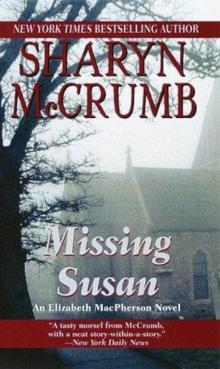 Missing Susan
Missing Susan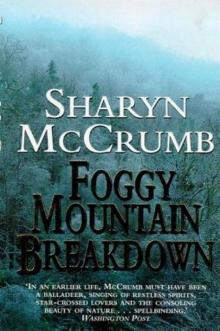 Foggy Mountain Breakdown and Other Stories
Foggy Mountain Breakdown and Other Stories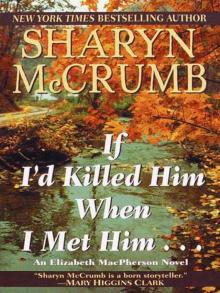 If I'd Killed Him When I Met Him
If I'd Killed Him When I Met Him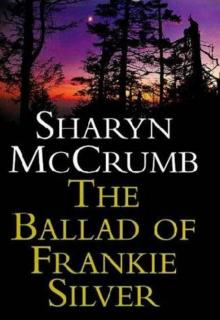 The Ballad of Frankie Silver
The Ballad of Frankie Silver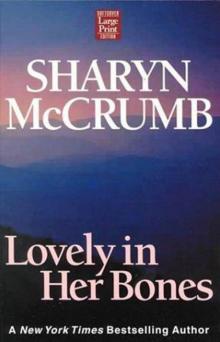 Lovely In Her Bones
Lovely In Her Bones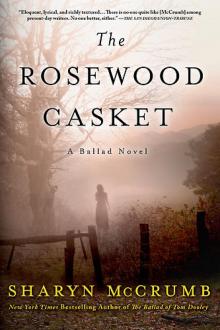 The Rosewood Casket
The Rosewood Casket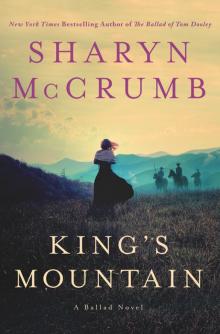 King's Mountain
King's Mountain